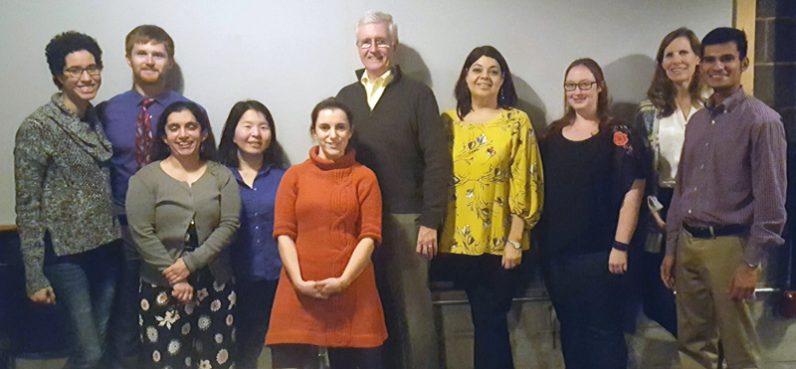
Some members of the young adult group of Nativity B.V.M. Parish in Media spend time with guest speakers at the Theology on Tap event Oct. 15, John Delaney (back row center) and to his right, Leslie Davila. They lead the archdiocese of Philadelphia’s Office for Investigations and Office for Child and Youth Protection, respectively.
Young adults in their 20s and 30s from Nativity B.V.M. Parish, Media, gathered for a Theology on Tap event at Sterling Pig Brewery in Media Oct. 15 to discuss the sexual abuse scandal, and healing in the wake of it.
Guest speakers Leslie Davila, director of the archdiocesan Office for Child and Youth Protection, and John P. Delaney Jr., director of the archdiocesan Office for Investigations, discussed efforts in the Philadelphia Archdiocese to protect children from abuse and bring healing to all the past victims.
The topic was not easy to discuss but it remains important. Most of the event’s attendees have been involved in ministry with youth, and all want to be part of the solution.
[hotblock]
“Talking about what we’re doing is part of restoring trust,” said Davila, who spent more than a decade at the Philadelphia District Attorney’s office directing victim assistance programs before she was hired by the archdiocese in 2011. Previously she served on the Keystone Crisis Intervention Team, helping victims and communities affected by traumatic events, and has co-chaired the Philadelphia Coalition for Victim Advocacy.
Davila explained the rigorous screening and training procedures enforced throughout the archdiocese, which exceed the requirements of the law in order to protect children from abuse. She also described the support which the archdiocese provides to victims of child sexual abuse and their families. The church pays for victims’ ongoing therapy or counseling, no matter where they live now or when the abuse occurred, she said.
“There is no limit on the timeline for victim services provided by the archdiocese,” Davila said. “Victim support happens independently of any investigation.”
She explained that victims don’t have to endure a long and stressful legal process before getting help, and they will have it as long as they need it.
For his part, Delaney worked for the Office of the District Attorney for the City and County of Philadelphia for 36 years, during which time he prosecuted many sex offenders and rose to the rank of First Assistant District Attorney. He is also a founding member of the Philadelphia Children’s Alliance, which promotes healing and justice for sexually abused children.
With this extensive professional experience, Delaney understands the skepticism with which many people today view the church in the wake of the scandals. He admits he also has asked himself, “Does the church get it?”
Today Delaney says with confidence, “the church does get it … (Archbishop Chaput) has sat down personally with victims and heard them.” Delaney believes this kind of personal interaction is crucial to gain an understanding of the deep human suffering caused by abuse, and to demonstrate recognition of each victim’s inherent dignity.
Both Davila and Delaney stressed the importance of transparency in ending child sexual abuse. For them, that means sending credible complaints of abuse to the District Attorney’s office for investigation, identifying sexual abusers both living and deceased on the archdiocesan website, and explaining their work to groups like the young adults of Nativity B.V.M. But transparency is not just the work of professionals.
The young adults present wanted to know “What can we do for victims of sexual abuse?”
“Abuse happens in the dark,” said Davila. “So let’s talk about it, bring it to light. Create an environment where victims can come forward. Encourage people to get help and report it.”
As the conversation drew to a close, the participants thanked Davila and Delaney. “Thank you so much for your work,” send Jennifer Weinhardt. “What you do is so important.”
PREVIOUS: ‘Lights On Afterschool’ illuminates programs for at-risk youth
NEXT: Black Catholics fill cathedral to honor St. Martin de Porres



Share this story